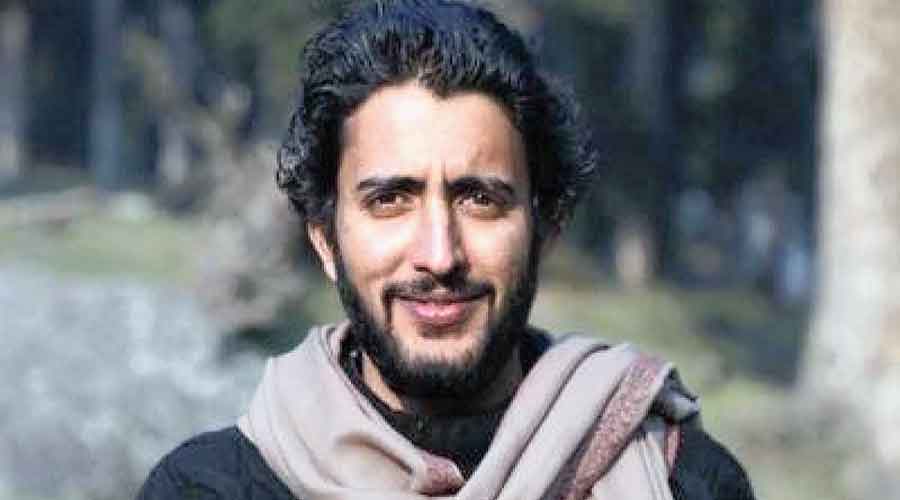Jammu and Kashmir police have booked a journalist under the stringent Public Safety Act apparently to prevent him from securing a third bail in a row.
The action against Fahad Shah, who edits online news website The Kashmir Walla, comes at a time a three-member fact-finding committee of the Press Council of India has accused the administration of stifling the Valley media through “extensive curbs”. It has revealed that 49 journalists have been arrested in Kashmir since 2016.
The government has not revealed the grounds for Shah’s detention under the PSA, which allows up to six months’ detention without trial and makes bail difficult to obtain. In January, Shah’s colleague and trainee reporter Sajad Gul was booked under the stringent act.
Shah’s counsel Umair Ronga has tweeted that the authorities have invoked the PSA against his client fearing the courts might grant bail “as the allegations levelled against the accused (do) not prima facie connect him with the commission (of) any offence”.
Shah, one of many young journalists undeterred by the crushing crackdown on dissent, was arrested on February 4 and booked under the anti-terror law UAPA for allegedly glorifying militancy through his reports, spreading fake news and inciting people.
A National Investigation Agency court granted him bail on February 26 but he was soon arrested in a different UAPA case. On March 5, he received bail again, only to be rearrested.
“Update: after bails in two cases — UAPA, sedition, and other charges under IPC — and before final bail, Fahad Shah, editor of @tkwmag has been booked under PSA (Public Safety Act),” Yashraj Sharma, Shah’s colleague, tweeted.
The police recently said three FIRs had been lodged against Shah at different police stations. He is being detained at Safa Kadal police station.
In one case, Shah has been charged under Sections 147 (rioting), 307 (attempt to murder), 109 (abetment), 501 (printing or engraving defamatory matter) and 505 (public mischief) of the Indian Penal Code.
Crackdown queried
The fact-finding committee of the Press Council of India, a statutory quasi-judicial body which acts as a watchdog, has condemned the government’s treatment of Valley journalists.
The panel was set up after a complaint from PDP president Mehbooba Mufti last September. It met stakeholders in Jammu and Srinagar and submitted its report last week to the council, which is yet to debate and adopt it.
“Our conclusion and recommendation is very specific: those indulging in any criminal acts are not journalists pursuing their profession. If a ‘journalist’ is bearing arms or carrying grenades and other ammunition, he is not a journalist; he is a militant, and should be treated as such,” the committee has said.
“However, the security establishment cannot label writing against government policies, or quoting a family or civilian sources in a story about excesses of the armed forces, or tweeting a point of view as ‘fake news’ or ‘anti-national activity’ and then arrest the journalist for sedition. It is not the business of journalists to support government policies or development work.”
The report says that journalists in the Valley face high levels of stress because of constant pressure from government agencies, police and the militants and that their ability to do their job in such a hostile environment is commendable.
“At a broader level, because of the continuing conflict, the business of news media has been severely disrupted in the region and sources of advertising are slowly withering away,” it says, adding that the print media in particular is “hardly sustainable any more”.
The report says the administration suspects that a large number of local journalists are sympathisers of the militants’ cause.
“This was admitted by lt governor Manoj Sinha, who frankly told the FFC (fact-finding committee) that many journalists were of ‘anti-national’ persuasion. He conceded that when he was first appointed, he used to encourage open press conferences, but now had gone back to a ‘selective engagement’ with preferred journalists,” the report says.
.“We have listed cases of journalists being summoned to the dreaded ‘Cargo Centre’ for questioning – a location reserved for interrogation (of) armed militants. Officially, the police have conceded to the FFC that as many as 49 journalists have been arrested and charged since 2016, not a small number considering that J&K has a very small press corps.”
The crackdown on journalists intensified recently after the government declared the Kashmir Press Club, the largest body of Valley journalists, illegal and took over the premises.
This was preceded by dramatic events — with the government first putting the club’s recently issued re-registration on hold and then trying to unsuccessfully impose its alleged proxies on the journalists’ body.










